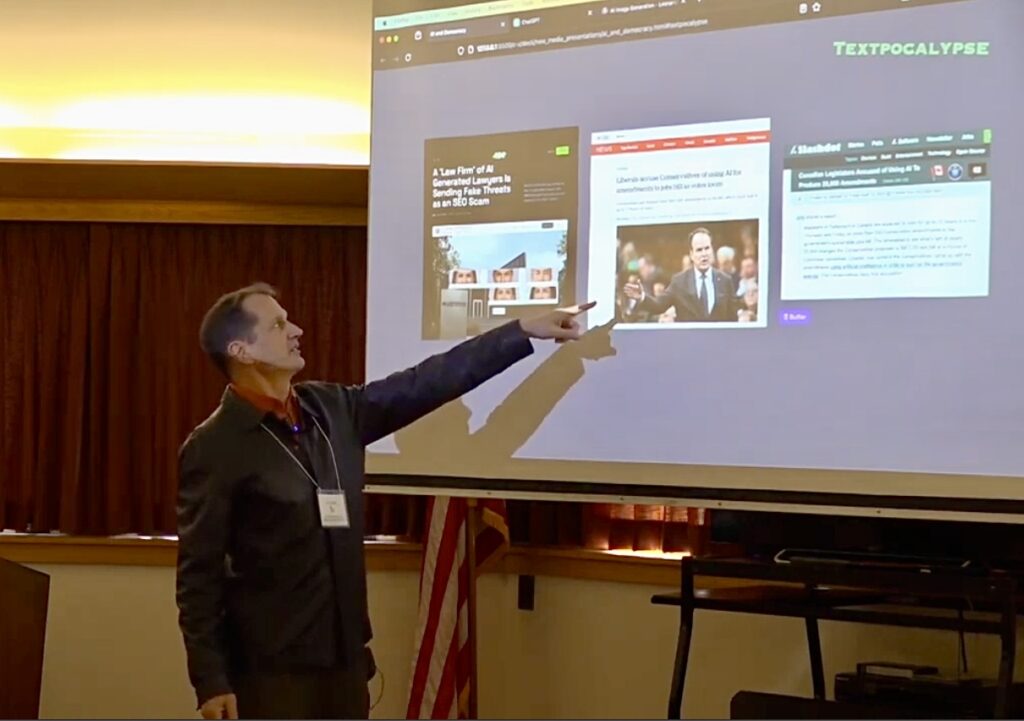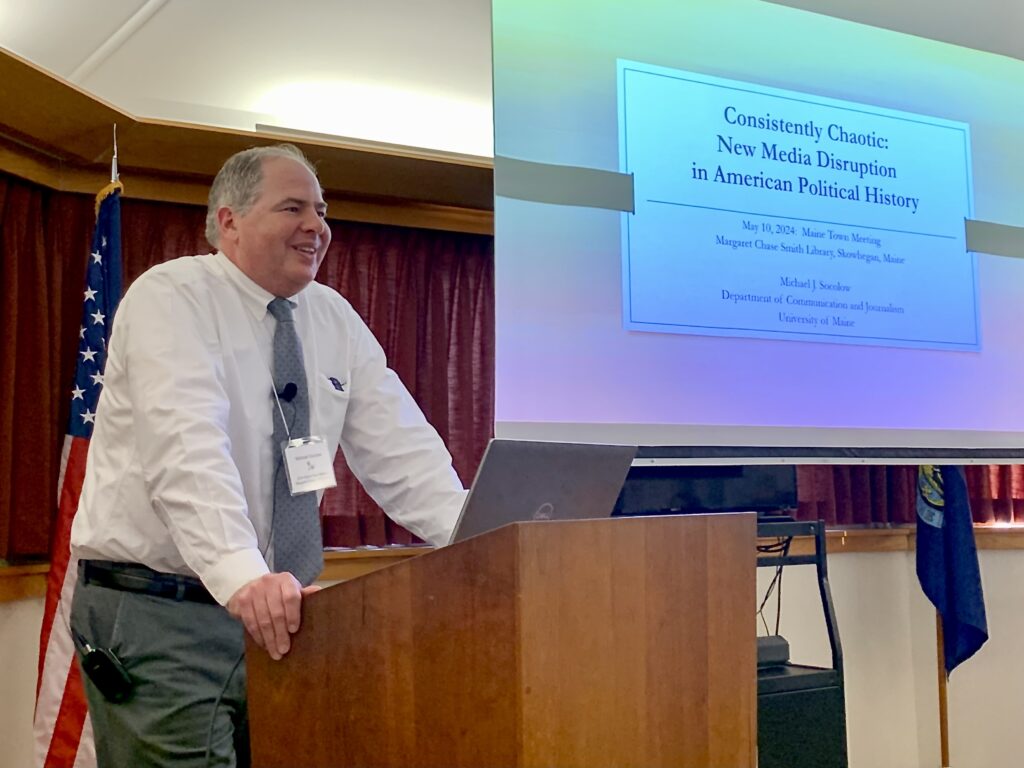Deep-faked images and other media may get all the headlines when it comes to endangering democracy, but the 2024 Maine Town Meeting revealed that the rise of generative AI arms saboteurs with many more insidious ways to destabilize elections.
With high stakes elections coming in the US, India, South Korea, and elsewhere in 2024, leaders like US Commerce Secretary Gina Raimando are “very worried” about AI threat to disrupt democracy. In a talk for the 2024 Maine Town Meeting held by the Margaret Chase Smith Policy Center in Skowhegan entitled Bots, Ballots, and You, Jon Ippolito surveyed five threats posed by free tools that can fabricate media, code, and text in a matter of seconds. He also evaluated a handful proposals to counter each of these threats–most of which he deemed not up to the task.
 In live demos with free online tools, Ippolito showed how easy it is to clone the likeness of Joe Biden or a local official to give the impression they did or said something compromising. A “spot the fake” quiz for the audience showed how hard it can be to spot these fabrications.
In live demos with free online tools, Ippolito showed how easy it is to clone the likeness of Joe Biden or a local official to give the impression they did or said something compromising. A “spot the fake” quiz for the audience showed how hard it can be to spot these fabrications.
Apart from such deep fakes, would-be election hackers have a an arsenal of other tactics to disrupt elections, including fabricated news. Ippolito showed how easy it is to jailbreak ChatGPT into writing a news story about a fake scandal involving the current president–in this case, by framing the article as a scene from a Tom Clancy novel. Another text-based disruption is what literature scholar Matthew Kirschenbaum has called textpocalypse, whereby the ease of generating articles floods the Internet with stories from bogus news organizations, making it impossible for readers to separate the wheat from the chaff. An example of text generation gumming up government is the recent claim by Canadian legislators that the opposition party added 20,000 amendments to slow bill passage through its parliament.
The workshop also demonstrated how easy it is to use a chatbot to develop malware to hack into and potentially disable election infrastructure like government and candidate websites.
Eager to reassure an anxious public, the AI industry has worked with governments to propose solutions to mitigate these risks. Unfortunately most of these proposed solutions are full of holes, with easy workarounds.
AI watermarks are a case in point. Even if tech companies and governments mandate labels for AI-generated content, an easy workaround is using an open-source model or taking your own photo of an image to remove even a steganographic watermark.
Ippolito argued instead for trusted sources to add reliable digital signatures to their media to vouchsafe for their validity. We may not be able to tell when something is fake, Ippolito argued, but we could tell when something is real.
 Lastly, he suggested the democracy depends on the thriving local journalism to ferret out deep fakes and serve as a touchstone for citizens keen to cast their vote based on facts rather than AI fantasies and fabrications. Unfortunately, the ad-driven, polarizing social media epitomized by Facebook and Twitter/X have created media monopolies and filter bubbles that have hollowed out local, objective journalism. Injecting humans back into the equation may be more important than any proposed technical solution.
Lastly, he suggested the democracy depends on the thriving local journalism to ferret out deep fakes and serve as a touchstone for citizens keen to cast their vote based on facts rather than AI fantasies and fabrications. Unfortunately, the ad-driven, polarizing social media epitomized by Facebook and Twitter/X have created media monopolies and filter bubbles that have hollowed out local, objective journalism. Injecting humans back into the equation may be more important than any proposed technical solution.
Fortunately, the other speaker in this town meeting was veteran journalist and media historian Michael Socolow, who surveyed the ways past media have disrupted the political process, from the penny press and telegraph to radio and TV. Socolow shared shocking examples of technologies that tilted contests in favor of one candidate or another, as when Western Union in 1876 shared private telegraphs of the opposing party to ensure Rutherford B. Hayes was elected the 19th US president.
Socolow’s overall message? “Don’t panic. We’ve been here before.”
An interactive table of contents lets viewers jump to recorded segments of a Ippolito’s workshop, which includes such audience questions as how deep fakes are generated, how the data of ordinary citizens are used to train AI models, and when using these tools is appropriate.

